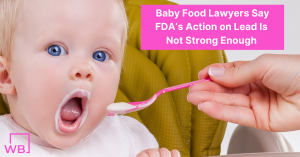
Baby Food Lawyers Say FDA’s Action on Lead Is Not Strong Enough
Toxic baby food lawyers from Wisner Baum say the FDA's plan still leaves babies and toddlers exposed to toxic lead levels that can lead to injury.
“For babies and young children who eat the foods covered in today’s draft guidance, the FDA estimates that these action levels could result in as much as a 24 to 27 percent reduction in exposure to lead from these foods,” said FDA Commissioner Robert M. Califf after the action plan was announced.
To put the FDA’s proposed action plan in perspective, the agency allows for 5 ppb of lead in bottled water. The baby food lawyers at Wisner Baum believe the FDA action plan simply does not go far enough to protect vulnerable young children from the dangers of toxic metals like lead.
“We represent thousands of children throughout the country who were diagnosed with autism or severe ADHD after consuming high levels of lead and other heavy metals in popular baby foods,” says Wisner Baum attorney Pedram Esfandiary. “While FDA's proposal for limiting lead in baby food is a positive step in the right direction, the fact that it's taken this long to curtail the amount of lead allowed in the food we feed our children—indeed that such regulatory action is even necessary--should give parents pause.
“There is no safe amount of lead exposure that is safe for babies, so if the agency is serious about protecting them from neurodevelopmental harm, FDA needs far more rigorous safeguards for lead and all other dangerous heavy metals in baby foods.”
Esfandiary adds that the action plan is not mandatory for the baby food industry, nor will it take effect immediately. However, the proposed limits on lead in baby food would allow the agency to take enforcement action against companies that exceed them. For example, if a baby food product tests above the lead threshold, FDA could take action to remove it from store shelves or ask a company that sells the product to issue a recall.
“The FDA’s new Action Levels for Lead is an improvement, but it still leaves babies and toddlers exposed to toxic lead levels that can lead to neurodevelopmental disorders such as ASD and ADHD,” says Wisner Baum baby food lawyer Stephanie B. Sherman. “When only 5 ppb is allowed in drinking water for all ages, how is 10 ppb and 20 ppb acceptable for fruits, veggies and dry cereals for babies? These new levels are not acceptable and still expose developing baby’s brains to permanent, irreversible damage. More needs to be done to provide a toxin-free environment for the food we grow for our children…and adults, for that matter.”
The World Health Organization (WHO) has stated that there is “no level of exposure to lead that is known to be without harmful effects.”
The Department of Health and Human Services’ Agency for Toxic Substances and Disease Registry (ATDSR) ranks lead just behind arsenic as the naturally occurring substances that pose the most significant risk to human health. Linda McCauley, who serves as the Dean of the Nell Hodgson Woodruff School of Nursing at Emory University, has said, “no level of exposure to these metals has been shown to be safe in vulnerable infants.” Exposure to several sources of heavy metals can cause cumulative effects that are particularly dangerous for babies and infants, McCauley adds.
First Baby Food Lawsuit Goes to Trial in Spring of 2023
Wisner Baum is taking the first baby food lawsuit to trial in the Spring of 2023. Plaintiffs Melissa and Lorenzo Cantabrana of California (Case No. 21STCV22822) allege their minor son developed autism spectrum disorder (ASD) and attention-deficit/hyperactivity disorder (ADHD) after consuming substantial quantities of baby foods from the following manufacturers:
• Beech-Nut
• Gerber
• Hain Celestial Group – Earth's Best Organic
• Nurture – Happy Family Organics and Happy BABY
• Plum Organics
• Sprout Foods – Sprout Organic Food
• Walmart – Parent’s Choice
Wisner Baum seeks to hold these companies accountable for knowingly selling baby foods that contain dangerous levels of lead and other heavy metals linked to neurodevelopmental disorders. As of January 2023, the firm represents nearly 3,000 clients in the toxic baby food litigation. To see if you qualify for a baby food lawsuit or to learn more about your legal rights, call at (855) 948-5098 to schedule an appointment with a baby food lawyer.
Robin McCall
Wisner Baum LLP
+1 310-207-3233
email us here
Visit us on social media:
Facebook
Twitter
LinkedIn
Instagram
YouTube
TikTok
What are heavy metals and why are they in baby food?
EIN Presswire does not exercise editorial control over third-party content provided, uploaded, published, or distributed by users of EIN Presswire. We are a distributor, not a publisher, of 3rd party content. Such content may contain the views, opinions, statements, offers, and other material of the respective users, suppliers, participants, or authors.



